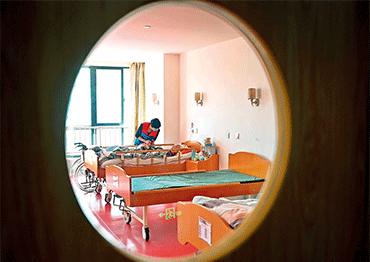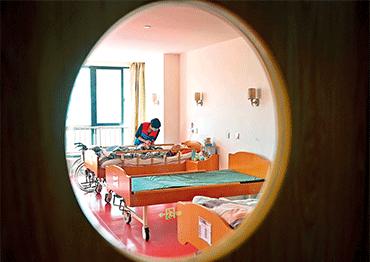As the impact of China’s rapidly aging society increases, experts are urgently calling on authorities to roll out a national insurance scheme to address the dearth of long-term care for the country’s seniors

A caregiver from nursing agency Qingniao Yiju attends to a senior who has long-term care insurance at a social welfare center, Jinjiang, Fujian Province, November 25, 2021 (Photo by Xinhua)
In his career prime, Hu Yong, a professor at Peking University, found himself overwhelmed with the demanding task of caring for his 85-year-old mother who was diagnosed with Alzheimer’s disease. His life and work fell into disarray.
In his 50s, Hu tends to his mother, who has lost her memory and the ability to care for herself. She cannot control her bowel movements, requiring constant vigilance. Hu cooks three meals daily, does the laundry and handles her medication. In between, he squeezes in work, sleep and time with his kids. This has been his routine for three years.
A recent article from news outlet ifeng.com highlighting Hu’s struggles sparked a discussion about the challenges of elderly care. “I never expected that someone at my age with my professional background would become a full-time caregiver one day,” Hu said. He considers himself fortunate to have a flexible job and siblings to share the burden.
China became a “deeply aging society” in 2021, with 14 percent of its population aged 65 and above. By the end of 2022, there were 280 million people in China over 60, including 44 million who are partially or fully disabled, or are burdened with dementia. According to the China Research Center on Aging, 40 percent of those over 80 are disabled to some extent.
Disabled seniors require varying degrees of long-term care to manage basic daily activities such as dressing, bathing, eating and toileting. Other tasks like cooking, shopping, housework and using public transportation measure their degree of independence. By 2020, 17.8 percent of China’s population over 60 required assistance with some of these activities. A Peking University survey of 450 villages and communities in 28 provinces found that 11 percent of those in need were left unattended.
Beating the Odds
Not everyone has the time and energy Hu has to care for their elderly relatives.
Wang Fang, an experienced elder care nurse from Nantong, Jiangsu Province, has witnessed the harsh realities that China’s unattended disabled seniors face. One 80-year-old man she began assisting in 2017 spends his days lying on a waterproof pad with a bedpan nearby. He has been bedridden for over 20 years.
His daughter and son are too busy to visit regularly, leaving his elderly wife to provide most of his daily care. The occasional weekend visits from his son and son-in-law for a simple wash are not enough, as evidenced by the large bed sores Wang noticed when she first arrived.
The man at first refused Wang’s help to wash, fearing his children might stop visiting if she took over. “He said, now that you help me wash, what should I do if my children stop visiting me?” Wang said.
This reflects a common dilemma: elderly couples often care for each other with financial support from their busy children, who avoid hiring carers to save money. “In Nantong, hiring a carer costs 5,000-6,000 yuan (US$700-830) a month, about 1,000 yuan (US$140) higher than the average wage. The average pension is around 2,000 yuan (US$280). Most families can’t afford a carer,” Wang said.
Nantong, which entered an aging society as early as 1982, had 2.32 million people aged 60 and above by 2020, accounting for 30.01 percent of its total permanent residents. By 2023, this had risen to 32.75 percent. The city is known for longevity, often with one elderly partner caring for another, which traps the primary caregiver at home without a social life and causes the cared-for partner to feel guilty.
The pressure on their relatives is not only physical and financial, but also psychological, Wang said.
The challenges of family caregiving highlight the weakening role of traditional family support for the elderly, several interviewed experts said. The situation is exacerbated by demographic shifts from China’s family planning policy, resulting in fewer children to share the burden.
Wang noticed that in many singlechild families (known as the 4-2-1 family structure: four grandparents, two parents and one child), one spouse often quits their job to take care of parents, leading to loss in income. It is common for couples to juggle work and caregiving. “But they can’t devote enough attention to the needs of the elderly, and this compromises their quality of life,” Wang said.
Rapid urbanization has worsened the situation, with many young people from places like Nantong relocating to larger cities such as Suzhou and Shanghai.
This demand has resulted in the rise of unregulated nursing centers. Tang Heng, a sociologist researching elder care institutions, discovered some in small cities in northern China. Often advertised as domestic services companies, these uncertified centers provide basic care at low costs, slightly over 1,000 yuan (US$140) per month.
“People [in the homes] can’t find anyone to care for them, nor can they afford legitimate institutions,” Tang said.
Long-term Solution
Long-term care insurance (LTCI), currently being trialed in 49 Chinese cities, is regarded as a future solution for elder care.
Launched in 2016 in 15 cities, LTCI programs target chronically disabled people, covering basic daily and medical care costs. Funded mainly by recipients’ medical insurance and fiscal subsidies, programs pay a varying proportion of care costs according to city.
For example, in Ningbo, Zhejiang Province, disabled seniors in nursing institutions receive a daily subsidy of 40-60 yuan (US$6-8), while those who stay at home get 20-30 hours of care services a month. Some cities provide cash allowances or combine subsidies with free services.
By June 2023, 170 million people were enrolled in LTCI programs. Benefiting over two million of them and costing approximately 65 billion yuan (US$9b), LTCI reduces families’ burdens by an average of 14,000 yuan (US$1,950) annually, according to the National Healthcare Security Administration (NHSA).
Despite progress, pilot cities have been cautious in implementing LTCI programs, resulting in narrow coverage. Most cities only cover “urban employees”: people employed or formerly employed by companies or institutions that pay into a city’s medical insurance and pension programs on their behalf.
In Ningbo, the program initially covered urban employees until 2022, when it expanded to include all residents in urban and rural areas with medical insurance. For the latter, the government covers the majority of fees.
Yan Jing, an official with Ningbo’s healthcare security administration, acknowledged the narrow coverage excludes many residents without pensions or adequate medical insurance. Additionally, most elderly people prefer to live at home rather than in nursing institutions.
Zhang Yinghua, an executive researcher at the Center for International Social Security Studies at the Chinese Academy of Social Sciences (CASS), noted that the biggest challenge for LTCI programs is long-term risk. As the aging population expands, the number of disabled people will increase, making it difficult to predict government spending. This uncertainty has slowed the release of a unified national program.
“Before the overall policy framework comes out, pilot cities are naturally going to be prudent. The majority of LTCI programs have substantial surpluses, meaning that the money was not effectively spent. Some local governments are consciously controlling expenditure,” Zhang noted.
Zhang found that by 2021, 26 of the 49 pilot cities only covered urban employees, while 18 covered all residents.
Feng Wenmeng, a research fellow with the Development Research Center of the State Council, suggested eliminating the distinction between urban employees and other residents when it rolls out nationally despite the challenges, particularly for places starting to feel the pinch in their medical insurance funds.
Currently, LTCI funding mainly relies on medical insurance. “Medical insurance funds in different places are rather imbalanced. Transferring costs from medical insurance funds is not sustainable in the long run when fully implementing the LTCI program. It should be an independent insurance product with its own fund,” said Zheng Bingwen, director of the Center for International Social Security Studies at CASS. Merging LTCI payments into medical insurance as a new item could create a capital pool that could be managed independently, Zheng added.
Given the differences between pilot cities in funding, channels, standards, benefits and available services, Zhang suggested basing premium payments on residents’ per capita disposable income, with contribution rates determined by the majority’s acceptable level.
Despite these challenges, several interviewed experts called for the establishment of a unified national LTCI system as soon as possible. “As time goes on, the burden of disabled senior care in China will grow, making it more difficult to fully implement the system,” Feng said.

Two medical workers care for a disabled senior, Jinsheng Nursing Home, Ningbo, Zhejiang Province, January 22, 2024

A caregiver helps a disabled senior with rehabilitation exercises, Fuxingyuan Serviced Apartments for the Aged, Botou, Hebei Province, December 4, 2018

Medical workers lead a physical therapy session with a resident at a nursing home in Tangshan, Hebei Province, September 12, 2023 (Photos by Xinhua)
Regulation Needed
Zhang found that the biggest issue with current LTCI pilot programs is that companies providing in-home services “only offer those they can or are willing to provide,” like trimming nails or washing hair. These services may not meet the actual needs of disabled seniors, deviating from the programs’ intention of providing professional care.
An insider in long-term care told NewsChina that the LTCI pricing systems in many cities cannot bear the cost of professional services. For example, in third- or fourth-tier cities with lower costs of living, a designated service provider can earn around 70 yuan (US$10) per hour, allowing them enough room to hire professional caregivers. However, in first-tier cities, the same pay only attracts caregivers who lack experience. Also, lack of professional caregivers further lowers service quality.
Some nursing companies, paid for by the local government, act as intermediaries, employing hourly workers only when they receive an order. Some companies even use these government funds to pay family members to provide services at home, while taking a cut. “Family members are willing to do this because they get paid. But this completely skews the business,” the industry insider said.
In some pilot cities, nursing agencies offer rebates to family members to attract customers, said Yang Li, general manager of Pacific Wellness, a nursing home in Jiangyin, Jiangsu Province. This reduces service quality due to shrinking profit margins. Honest companies eventually retreat, leaving those only seeking subsidies.
Several interviewed health insurance bureau officials told NewsChina that there is no effective way to supervise the process, especially in-home care. Recording and infrared thermal cameras have proved ineffective, as caregivers, disabled seniors and their families can easily cooperate to evade the monitoring.
Additionally, it remains unclear whether LTCI should cover medical care. Many severely disabled individuals require services like changing nasogastric tubes and catheters, but most nursing institutions lack healthcare qualifications. “Therefore, in the majority of pilot cities, LTCI only provides daily care services,” said the director of an elder care service company who requested anonymity.
Disability assessment, a core part of LTCI programs, also requires improvement.
“Disability assessment is like a valve for LTCI spending. Improved evaluation criteria would help the government keep the insurance system running within a reasonable range, and keep it from getting too broad or narrow,” Zhang Yinghua said.
Initially, pilot cities set their own standards. But in August 2021, the NHSA and the Ministry of Civil Affairs released a unified evaluation standard, which considers daily life abilities, cognition, perception and communication.
Feng Wenmeng suggested improving on these indicators as understanding of LTCI deepens and needs change, particularly regarding healthcare and service recommendations for seniors with different disability levels.
However, assessments can be chaotic in practice. Some nursing agencies have sales teams that teach elderly people how to fake their evaluations to receive benefits, leading to insurance fraud.
Some are taught to pretend that they are unable to dress independently, have difficulty speaking clearly or limited mobility. Sales people can earn high commissions for helping clients pass the assessment and successfully applying for insurance. To earn more commissions, some even buy personal information about elderly individuals. “Such invalid assessments and insurance fraud are rather common,” the industry insider said.
Further national-level legislation is needed to regulate the market, including disability assessment, services, entry thresholds and supervision, interviewed experts said.
The government is taking steps. In December 2023, the NHSA and the Ministry of Finance released management measures for LTCI disability evaluations, clarifying requirements for agencies and evaluators that aim to ensure fairness and supervision during the process.
On May 6, the NHSA released new management measures for designated evaluation agencies, making local medical security institutions responsible for selecting and supervising them.
In January, the NHSA reaffirmed its commitment to building an LTCI system. Several interviewed experts predict that an overall policy framework might be released this year, while implementation details are expected next year.
In February, Zhejiang Province began efforts to roll out the program, aiming to cover all urban and rural residents by 2027.
“It’s a serious matter that requires the participation of the whole of society,” Hu Yong said. “Everyone will eventually be a carer or a care recipient.” Hu continues to balance his responsibilities, but knows it is unsustainable. “Any change in my mother’s condition could disrupt this balance and increase the burden.”

 Old Version
Old Version



